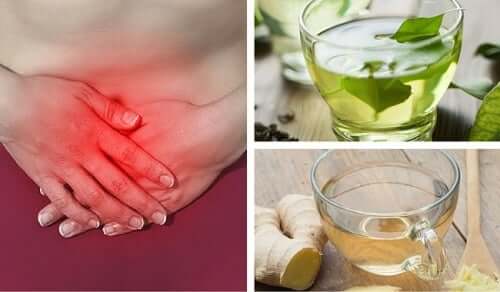Aerophagia Symptoms and Characteristics

Aerophagia symptoms are the result of excessive intake of air in the digestive tract, especially during meals. The term means “air eating.” It’s a minor digestive disorder. However, it often produces much discomfort. In fact, it’s often responsible for the upper air release that’s commonly known as belching (or burping). However, it’s important not to confuse with gastroesophageal reflux, which has similar symptoms.
Aerophagia can aggravate in the presence of other digestive problems, such as dyspepsia, or abdominal swelling. In children, aerophagia is relatively common and is commonly linked to infant colics.
The causes of Aerophagia

Normally, aerophagia is a consequence of an inadequate diet. Usually, it’s related to the excessive consumption of soft drinks, sugary drinks and other foods such as sweets, breadcrumbs, and chewing gum. It could even have its origin in bad eating habits during your meals, such as eating too fast. This is because it favors the entry of a large amount of air into the digestive tract.
It can also result from anxiety problems, such as stress. So, from a pathological perspective, it’s common in people who don’t properly coordinate the functions of swallowing and breathing. This is frequent in people with anxiety.
Aerophagia symptoms

Aerophagia manifests through a feeling of heaviness in the stomach, a sensation of bloating, and other digestive problems. Belching, along with flatulence, is how we relieve digestive discomfort.
Symptoms of aerophagia include:
- Abdominal distension: This is the result of gas pressure. Thus, excess air swells the abdomen. However, it’s easy to confuse this with other symptoms.
- Abdominal pain: Sometimes, the pain moves to the lower area of the sternum by pressing the air both to the stomach and the heart. Then, it’s possible to confuse the pain with another one that causes angina pectoris (coronary heart disease).
- Bowel sounds: Some conditions produce similar symptoms to those of aerophagia. Such is the case with gas that gives rise to abdominal sounds.
- Belching and non-smelly flatulence.
You may also be interested: Drinks That Aggravate Your Stomach the Most
Aerophagia diagnosis
Professionals establish a diagnosis when belching becomes repetitive and annoying, and it happens several times a week. Also, they check the amount of air ingested. The fundamental part of diagnosis is to rule out organic pathologies such as diseases of the upper digestive tract, intestinal malabsorption of carbohydrates, bacterial overgrowth and alterations in motility, among others.
Also read: Stomach Gas: Four Natural Remedies
Aerophagia prevention
You should maintain a proper diet to prevent aerophagia. Also, chew slowly and avoid certain foods that are conducive to inflammation, such as soda, candy or chewing gum, among others. If the swelling is due to stress, try to relieve your anxiety by following an appropriate treatment or reduce it with regular sports and relaxation activities. The symptoms of aerophagia usually disappear spontaneously once you treat the causes responsible for the disorder.
Treatment

Finally, it’s important to highlight that treatment will include a variety of measures to consider:
- Chew properly and do so slowly. Many people eat excessively, badly and quickly. This leads to weight gain and poor digestion problems. One of the things you can do to avoid and treat aerophagia is to eat and chew food slowly.
- Avoid heavy meals. A healthy diet helps prevent aerophagia. You shouldn’t eat heavy meals and should moderate your intake of extremely spicy foods and carbonated sugary drinks.
- Relax. Some people keep their nerves in their stomachs. In that’s the case with you, then find a way to release stress. It’ll lead you to a healthier life in general. To do so, begin by exercising regularly and eating more fruit, fish, and vegetables.
- Drink chamomile and other natural infusions. Certain natural ingredients are great for relieving some of the symptoms of aerophagia. Chamomile is the perfect natural remedy with which to treat and relieve excess gas.
- Drink plenty of water. This will keep you better hydrated. Also, when you drink more water, then you also reduce your consumption of soft drinks – these are a definite no-no!
- Finally, an abdominal massage could help you relieve some of the symptoms of this digestive system disorder.
All cited sources were thoroughly reviewed by our team to ensure their quality, reliability, currency, and validity. The bibliography of this article was considered reliable and of academic or scientific accuracy.
-
López Higueras, A. (2012). Protocolo diagnóstico de la aerofagia. Medicine. https://doi.org/10.1016/S0304-5412(12)70259-7
-
Velasco Benítez, C. A. (2013). AEROFAGIA, DOLOR ABDOMINAL RELACIONADO A DESÓRDENES GASTROINTESTINALES FUNCIONALES Y ESTREÑIMIENTO FUNCIONAL EN NIÑOS. Revista Gastrohnup.
-
Colaboración Cochrane. (2001). Efectividad del tratamiento en el cólico del lactante: revisión sistemática. Revista Pediatría de Atención Primaria.
This text is provided for informational purposes only and does not replace consultation with a professional. If in doubt, consult your specialist.








